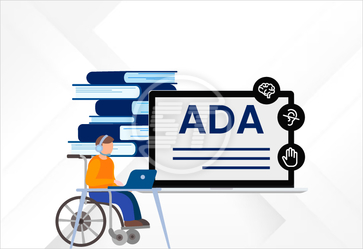In today's digitally interconnected world, accessibility to information technology is a fundamental right for all individuals, regardless of their abilities. The Kentucky State digital accessibility requirements stand as a testament to the state's commitment to equitable access for everyone. These standards mandate that state entities and state-assisted organizations ensure that digital resources are designed to accommodate both visual and non-visual formats, and that technology equipment and software meet the needs of individuals with disabilities. In this article, we delve into the intricacies of Kentucky's digital accessibility framework, examining its legal foundations, key provisions, and the tools that empower inclusivity.
YOU MIGHT ALSO LIKE: Web accessibility statistics that shows the importance of accessibility compliance!
What are Kentucky state digital accessibility requirements?
The Kentucky State Digital Accessibility standards mandate that all state entities and state-assisted organizations adhere to regulations ensuring equitable access to information technology equipment and software for individuals with disabilities. This encompasses the creation of digital resources designed to accommodate both visual and non-visual use formats. Furthermore, the technology, equipment and software procured must be under contracts featuring a technology access clause. The accessibility level should align with the guidelines established in Section 508.
Enacted in April 2000, the Kentucky Accessible Information Technology (AIT) law is structured into five sections, encompassing definitions, technology equipment requisites, IT procurement procedures, an exemption clause, and the protocol for addressing violations. The law reflects a commitment to ensuring that electronic and information technologies are accessible to individuals with disabilities, in line with the standards outlined in Section 508 of the Rehabilitation Act (29 U.S.C. 794d), as amended in 1998. Section 508 stipulates that agencies must afford individuals with disabilities equivalent access to electronic information and data, akin to those without disabilities, unless it poses an unreasonable burden on the agency. The technical benchmarks for conformity within this legislation are established by Section 508 Standards.
What are Kentucky state digital accessibility requirements?
The Kentucky state digital accessibility requirements, outlined in the Kentucky Accessible Information Technology (AIT) Law, pertain to ensuring equitable access to information technology equipment and software for individuals with disabilities. These are detailed in the Kentucky Accessible Information Technology (AIT) Law, encompassing several provisions:
1. Access Requirements (KRS 61.982)
Covered entities must ensure that their information technology equipment and software grant individuals with disabilities, including the blind, visually impaired, and deaf or hard of hearing, the same access that those without disabilities have. Information presentation should cater to both visual and non-visual use, and the procurement of technology equipment must adhere to the technology access clause mandated by KRS 61.984.
YOU MIGHT ALSO LIKE: Cost to make ADA compliant website
2. Procurement of Information Technology (KRS 61.984)
The Finance and Administration Cabinet is responsible for establishing a technology access clause that aligns with federal regulations (Section 255 of the Federal Telecommunication Act of 1996 and Section 508 of the Federal Workforce Investment Act of 1998). This clause must be incorporated into contracts for information technology procurement by covered entities after July 14, 2000. Alternative and non-visual access standards must be included to ensure compliance with KRS 61.982 requirements.
3. Exclusion of Technology Access Clause (KRS 61.986)
Covered entities may exclude the technology access clause for certain instances, such as when the cost presents an undue burden. However, exclusion is not permitted for aspects like compatibility with non-visual access, initial system design, interactive equipment and software procurement. Information technology purchased before July 14, 2000, must be brought into compliance with the law during equipment or software upgrades or replacements.
4. Injunctive Relief for Violations (KRS 61.988)
Individuals who experience injury due to violations of the accessibility requirements can pursue injunctive relief through legal action within four years of the violation occurrence.
YOU MIGHT ALSO LIKE: International web accessibility standards and how to compliant with it.
What are the assistive tools to meet Kentucky state digital accessibility standards and requirements?
The assistive tools that can be utilized to meet the Kentucky state digital accessibility standards and requirements include a range of technologies designed to enhance accessibility for individuals with disabilities. These tools ensure that digital resources are accessible and usable, promoting inclusivity. Some of the key assistive tools mentioned in the content are:
1. JAWS (Job Access with Speech)
JAWS is a widely used screen reader specifically developed for users with vision loss. It offers both speech and Braille output, allowing individuals to navigate computer applications effectively, even if they can't see the screen. JAWS enables access to various computer programs on PCs, making them usable for individuals with visual impairments.
2. NonVisual Desktop Access (NVDA)
NVDA is a free screen reader that allows the blind and visually impaired to use computers independently. It can also translate text into Braille, enhancing accessibility further for those who have access to a Braille display. NVDA is compatible with Microsoft Windows, available for download onto PCs or USB sticks for use across different computers.
3. Apple's Accessibility Features (VoiceOver, Siri, "Type to Siri")
Apple's operating system for Mac users incorporates built-in accessibility features. VoiceOver is an advanced screen reader catering to individuals with visual or hearing impairments. Siri and "Type to Siri" assist users with various tasks, contributing to a more accessible digital experience for a diverse range of users.
4. ChromeVox
ChromeVox is a free screen reader integrated into Chrome OS. This tool provides immediate accessibility without the need for additional downloads. It enhances accessibility for users with visual impairments within the Chrome OS environment.
YOU MIGHT ALSO LIKE: ADA Tax Credit
5. Accessibility features for iPhone, iPad, iPod touch
Apple's iOS devices come with a suite of built-in accessibility features. VoiceOver serves as a robust screen reader for users with visual impairments, and Siri offers voice-controlled assistance. Dictation aids in typing and reading, making these devices more accessible for users with various disabilities.
6. Accessibility customization on android devices
Android devices can be customized with accessibility settings and apps. These features enhance usability for individuals with disabilities, allowing them to tailor their experience to their specific needs.
These assistive tools empower individuals with disabilities by providing them with the means to access and interact with technology, aligning with the Kentucky state digital accessibility standards and requirements. By leveraging these tools, organizations and individuals can create a digital environment that is inclusive and accommodating to all users, regardless of their abilities.
Conclusion
In summary, Kentucky's digital accessibility standards and requirements have established a strong foundation for fairness and equal access in the digital domain. These regulations guarantee that individuals with disabilities have the same opportunities to utilize technology as anyone else. By mandating state organizations to comply with these regulations, Kentucky is ensuring that everyone can utilize digital tools without encountering obstacles.
Skynet Technologies, an associate member of the International Association of Accessibility Professionals (IAAP) and a recognized member of W3C takes immense pride in its contributions to the global accessibility community.
Our expertise lies in delivering ADA website accessibility remediation services that cater to a diverse array of requirements. Whether you are in need of fundamental enhancements or a comprehensive overhaul of website accessibility, rest assured, we have your needs met. Our array of services encompasses every facet of website accessibility, including design, audit, consulting, remediation, support, and ongoing maintenance.
Please feel free to get in touch with us via email at [email protected] or by utilizing the provided form. Our mission is to assist you in enhancing the accessibility of your digital presence, ensuring inclusivity for all.


